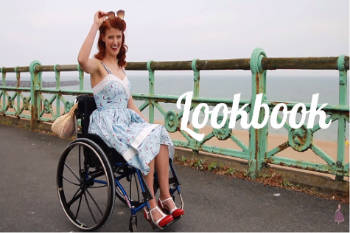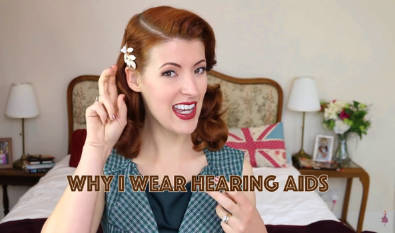

Among the roughly 50 million content creators fueling the YouTube phenomenon, the voices of social minorities are increasingly standing out from the crowd. Their unique perspectives add color to the platform as they overcome physical and social barriers to reach viewers on topics ranging from airsoft guns to gender, disability, makeup and fashion. Ewha Voice met three talented YouTubers, Jessica Kellgren-Fozard, a Brit giving a voice to those with disabilities and in the LGBTQ (lesbian, gay, bisexual, transgender and queer/questioning) community, another British creator, Joseph Harwood, who also focuses on LGBTQ issues as well as his popular tutorials on drag makeup. Finally, we met Bread Park, a blind Korean who reviews airsoft weapons. Although they come from different backgrounds, all three have one thing in common: through YouTube they have found their voice.
Amid a vast array of creativity on the YouTube platform, full-time vlogger Jessica Kellgren-Fozard stands out thanks to her diverse videos about vintage fashion and her daily life as a disabled and LBGTQ individual.
The British YouTuber who has more than 330,000 subscribers started her channel in 2011 with a video about sign language. As a person suffering from deafness, blindness, hereditary neuropathy with pressure palsies (HNPP) and mixed connective tissue disorder (MCTD), which cause chronic fatigue and pain, she shares her stories about her illness and disabilities. As a lesbian, she also talks about her marriage to her wife, Claudia. What’s more, she is also well-known for her vintage fashion and hair tutorials.
Before embarking on her YouTube career, Kellgren-Fozard worked at a local TV station in Brighton. “There, I did work with my disabilities but I didn’t really express a lot about them,” she said. “I saw some difficulties online for disabled people but found out there was no one talking about them. So, I thought I would rather make my own contents that I have full control of, to talk about things that I think are important. I thought the contents will educate people and help spread awareness of disability and sexual minorities.”
She aims to promote change in the society through her videos, her personal experience of finding support online having influence on her. “YouTube can be a great support for disabled people, especially because watching the videos makes them feel less lonely,” she said. “Being disabled may mean that a person has to stay in bed all day and I am one of those people who has to stay in bed for days. It was comforting for me to find more people spending a lot of time in bed through YouTube and when we come together online, I don’t feel alone anymore.”
Kellgren-Fozard has found an interested audience not just for her videos on disability and LGBTQ issues, but also on her vintage fashion style. Her contents connect people with similar tastes and give them tips on alternative beauty.
“This intimacy of YouTube is one thing special about the platform,” Kellgren-Fozard shared. “It connects those who are in the same situation and every audience by making them think that they are watching a genuine daily experience of someone. This makes contents on YouTube more special than traditional media. When people are watching TV, they are aware that behind the scenes there are cameras, lights, sounds and all other things controlled and scripted. However, YouTube creates a kind of connection that makes people think that they are experiencing and watching honest feelings of the person in the video.”
Her fabulous work has proved that YouTube can influence society by amplifying the voices of disabled people. She recently uploaded a video named “Banning Straws Hurts People” in which she explains how the UK’s new policy of banning the use of plastic straws can affect disabled people. Although such policies are implemented to protect the environment by cutting the use of plastic, she explains that it makes many restaurants and coffee shops inaccessible for people with certain disabilities. “There are people who cannot drink easily without plastic straws, so the policy change can limit their capacity.” In the video, she also compares different types of straw and explains why plastic straws can be more useful than those made of other materials. In her video, she gives voice to a little-heard perspective and educates people who are not aware of such difficulties that disabled people may face in their daily lives. Viewers commented that they had learned something they had not been aware of, and one poster wrote: “I have used a number of the facts you presented in a letter to my college’s food company who recently announced their ban on straws.”
Kellgren-Fozard went on to emphasize the value of YouTube’s auto-generated caption service for people with disabilities.
“YouTube is a lot better than other websites in that it encourages more diverse people to engage with the platform,” she said. “In Britain, we have three major broadcasters and they all have websites to which they upload videos and contents. However, they do not provide captions, not even an auto-caption service. While YouTube is killing this now, others not having such [services] is why their videos are not as viral as those on YouTube. This is not a service only for those who are suffering from hearing loss, but for everyone. These days, when people watch videos while they are on the train and surrounded by noise, people can’t always hear the sound of the video and they also need captions to watch the contents. We definitely have to bring this into the mainstream, guaranteeing every user access to all content.”
However, Kellgren-Fozard expressed her concern that YouTube is demonetizing videos about social minorities. Although she understands that YouTube’s algorithms are used to protect people by removing contents that are seen to discriminate against social minorities, this system automatically erases videos that are identified as “aggressive.” However, it sometimes also erases videos that are educational rather than discriminative in nature. Though the company says that the system will adapt and improve in the future, she thinks that further action should be taken to prevent such accidents.
She also pointed out that disabled YouTubers have only recently started to receive more attention, even though there are more than 10 million people with a limiting long-term illness, impairment or disability in Britain. “There always have been disabled people all around you but it is just that you are now noticing it and paying attention to them,” she said. “We are 20 percent of people in this country, which makes us the largest minority!”
With more than 200 ideas for her upcoming contents, Kellgren-Fozard is planning to continue stocking her channel with new videos. She also has a goal of reaching people through traditional media, by writing a novel featuring characters who are disabled, sexual minorities or minorities in other ways.
No more “Craptions”
Kellgren-Fozard has also released a series of videos about captions on YouTube celebrating the International Week of the Deaf, the last full week of September. Her videos titled “How to get 80% more views!” and “How to caption your videos on YouTube” give information about captioning and encourage more content creators to include captions on their videos. Captions improve the accessibility of YouTube for all and more people are asking YouTubers to include their own captions since auto-created captions are sometimes inaccurate and do not include all necessary information. This movement gained momentum through hashtag campaign #NoMoreCraptions started by 27-year-old American YouTuber Rikki Poynter. The deaf YouTuber made the movement go viral and many content creators are working together to promote change in the platform.

